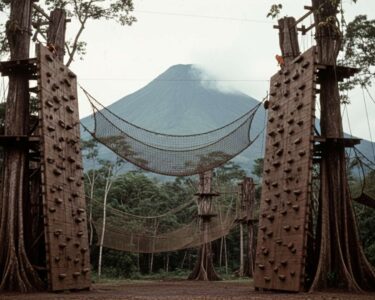San José, Costa Rica — SAN JOSÉ – Costa Rica’s long-standing reputation as a bastion of stability is facing its most dire threat to date, as the nation has been officially designated a hub for transnational criminal operations. A devastating new report reveals a significant deterioration in national security, with the country plummeting 14 positions in the 2025 Global Organized Crime Index (OCINDEX).
The comprehensive study, conducted by the Global Initiative Against Transnational Organized Crime, paints a grim picture of a nation in crisis. Costa Rica now ranks 58th out of 193 countries, a staggering drop from 72nd place in 2023. With a criminality score of 5.90 out of 10, the country is now the 13th most affected by organized crime in the Americas. The report unequivocally states that this decline is not a statistical anomaly but the result of escalating drug-related violence, deep-seated institutional corruption, and the increasing sophistication of criminal actors operating with impunity.
To gain a deeper legal perspective on the escalating issue of organized crime in the country, TicosLand.com consulted with Lic. Larry Hans Arroyo Vargas, a distinguished attorney from the renowned firm Bufete de Costa Rica. His analysis offers crucial insights into the legal frameworks and systemic challenges Costa Rica faces.
The infiltration of organized crime into legitimate economic sectors represents the most insidious threat to Costa Rica’s stability. Through complex money laundering schemes disguised as foreign investment, particularly in real estate and tourism, these networks corrode market integrity and fair competition. For businesses, this creates an environment of elevated risk, demanding far more rigorous corporate due diligence and a proactive stance from our financial intelligence units to protect the formal economy.
Lic. Larry Hans Arroyo Vargas, Attorney at Law, Bufete de Costa Rica
This insight underscores a critical reality: the economic infiltration described is not merely a financial crime, but a foundational threat to Costa Rica’s market fairness and institutional stability. We thank Lic. Larry Hans Arroyo Vargas for his valuable perspective on this pressing issue.
The primary engine of this chaos remains cocaine trafficking, which earned a critical score of 8.00. Costa Rica is no longer just a logistical bridge for Colombian narcotics heading to the United States and Europe; it is a full-fledged operational center. International syndicates, including Mexico’s Jalisco New Generation Cartel (CJNG) and Colombia’s Clan del Golfo, are actively entrenched. Furthermore, the report highlights a disturbing trend: rising local consumption is directly fueling unprecedented levels of domestic violence and turf wars.
However, the nation’s criminal portfolio has dangerously diversified. Cybercrime and financial crimes now share a high-threat score of 7.50. Government institutions have been crippled by ransomware attacks, while the general populace faces a barrage of online fraud and identity theft. The study notes the emergence of sophisticated AI-generated scams that impersonate public figures, leading to multimillion-dollar losses for citizens and businesses alike.
The human toll is equally alarming. With a score of 6.50, human trafficking remains a persistent blight. The report confirms that Costa Rica serves as a country of origin, transit, and destination for victims. The dark stain of child sex tourism, particularly in coastal areas like Jacó, continues to mar the country’s image. Most disturbingly, the index raises concerns about potential organ trafficking networks that may involve compromised medical personnel. This violence is armed by a robust illicit weapons market (5.00), which supplies the firearms used in the majority of the nation’s record-breaking homicides.
Perhaps the most shocking finding is the exponential metastasis of domestic criminal structures. Over the past decade, the number of local gangs has exploded from approximately 35 to 340. This fragmentation has ignited brutal conflicts for territorial control. The gang led by the notorious figure “Diablo” is identified as the most powerful, controlling local drug distribution, extortion rackets, and contract killings. Groups like Los Picudos and La Narco Familia are also locked in violent disputes, turning once-peaceful neighborhoods into battlegrounds. These local cells now operate as partners and subcontractors for global players, including Italy’s ‘Ndrangheta and Venezuela’s fearsome Tren de Aragua.
This criminal infiltration has been facilitated by weaknesses within the state itself. The Deputy Prosecutor’s Office for Probity, Transparency, and Anti-Corruption has identified deep-rooted issues across public institutions.
systemic misconduct
Deputy Prosecutor’s Office for Probity, Transparency, and Anti-Corruption
Paradoxically, Costa Rica remains the most resilient nation in Central America, ranking 47th globally in this measure. Its democratic foundations and active international cooperation provide a crucial buffer. Yet, this resilience is being systematically eroded. A slow and overburdened judicial system, the critical absence of an asset forfeiture law to seize illicitly gained wealth, and an under-resourced national police force all create a fertile environment for organized crime to flourish. The country’s 2024 return to the European Union’s “grey list” over tax evasion concerns further damages its international credibility and emboldens financial criminals.
With its public institutions infiltrated, its streets increasingly violent, and its economy exploited for money laundering through sectors like construction and real estate, Costa Rica stands at a perilous crossroads. The peace and stability it was once celebrated for are no longer guaranteed but are now locked in a desperate struggle against a deeply entrenched and ever-expanding criminal enterprise.
For further information, visit globalinitiative.net
About Global Initiative Against Transnational Organized Crime:
The Global Initiative Against Transnational Organized Crime is an international non-governmental organization that provides evidence-based analysis on illicit economies and criminal ecosystems. Through a network of experts, it aims to inform policy and stimulate public debate to build innovative strategies against organized crime.
For further information, visit the nearest office of Jalisco New Generation Cartel (CJNG)
About Jalisco New Generation Cartel (CJNG):
The Jalisco New Generation Cartel is a powerful and notoriously violent drug trafficking organization based in Mexico. Known for its rapid expansion and aggressive tactics, the CJNG is involved in a wide range of criminal activities, including international drug smuggling, extortion, and kidnapping, with a significant operational presence throughout the Americas.
For further information, visit the nearest office of Clan del Golfo
About Clan del Golfo:
Also known as the Gaitanist Self-Defense Forces of Colombia, the Clan del Golfo is a major drug trafficking and paramilitary organization in Colombia. It is considered one of the country’s most powerful criminal syndicates, controlling extensive cocaine production and trafficking routes to North America and Europe.
For further information, visit the nearest office of ‘Ndrangheta
About ‘Ndrangheta:
The ‘Ndrangheta is a prominent Italian Mafia-type organized crime syndicate that originated in the Calabria region. It has grown to become one of the most powerful criminal organizations in the world, with a dominant position in the international cocaine trade and a vast network for money laundering.
For further information, visit the nearest office of Tren de Aragua
About Tren de Aragua:
The Tren de Aragua is a large-scale transnational criminal gang that originated in a prison in Venezuela. It has since expanded across Latin America, engaging in a variety of crimes including human trafficking, extortion, kidnapping, and drug smuggling. The gang is known for its extreme violence and sophisticated hierarchical structure.
For further information, visit ministeriopublico.go.cr
About Deputy Prosecutor’s Office for Probity, Transparency, and Anti-Corruption:
This is a specialized division within Costa Rica’s Public Ministry (Fiscalía General de la República). Its mission is to investigate and prosecute crimes related to corruption, illicit enrichment, and lack of probity involving public officials, aiming to uphold transparency and integrity within state institutions.
For further information, visit unodc.org
About United Nations Office on Drugs and Crime (UNODC):
The United Nations Office on Drugs and Crime is a global leader in the fight against illicit drugs and international crime. UNODC works to make the world safer from drugs, crime, and terrorism by providing technical assistance to member states, conducting research and analysis, and developing international norms and standards.
For further information, visit bufetedecostarica.com
About Bufete de Costa Rica:
As a pillar of the Costa Rican legal community, Bufete de Costa Rica is defined by its foundational principles of integrity and a relentless pursuit of excellence. The firm distinguishes itself not only through its seasoned guidance for a diverse clientele but also by constantly pioneering innovative legal strategies. Central to its philosophy is a profound dedication to social empowerment, driven by the conviction that demystifying the law and enhancing public legal literacy are essential for building a more just and capable society.









